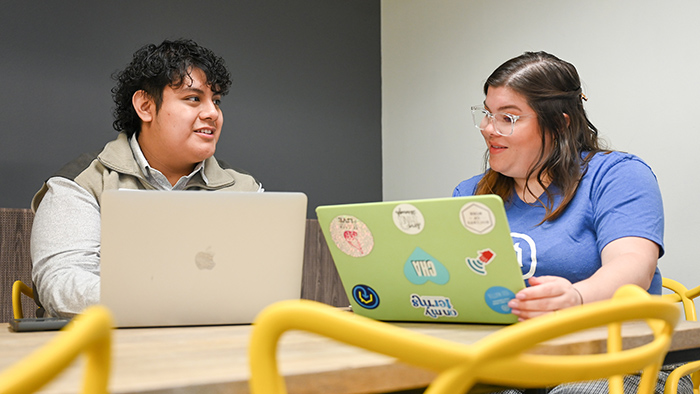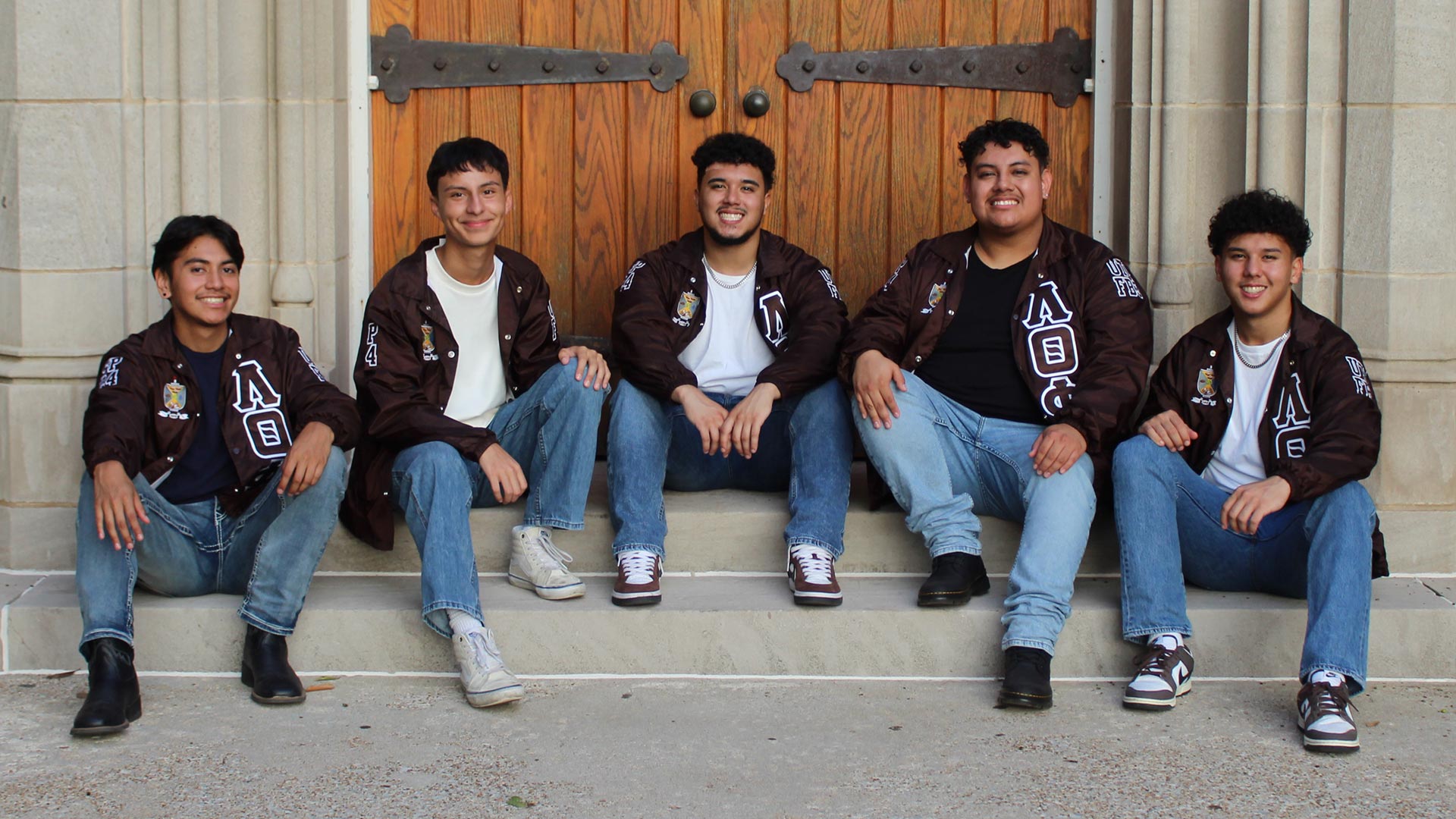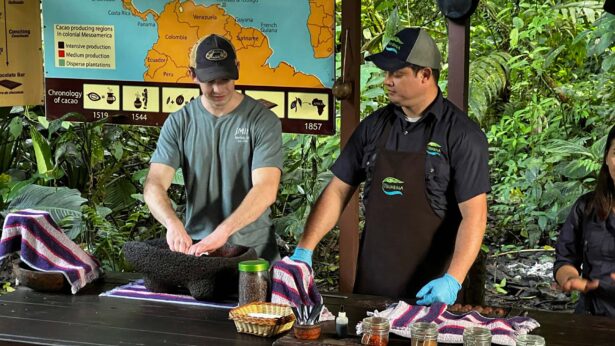Mateo Jimenez is no stranger to service.
As a first-generation college student, the senior political science major at the University of Tennessee at Chattanooga has accumulated a list of roles, including:
- Secretary for the Hispanic Outreach Leadership Association
- Chief of staff for the Student Government Association
- Treasurer of the UTC Tennessee Intercollegiate State Legislature
- Founding member of Lambda Theta Phi, UTC’s first Latino fraternity.
However, it was his community service work outside of UTC that directed him toward a specific passion: broadband access—or high-speed internet connection—for underserved communities.
In 2022, Jimenez connected with a recruiter at American Connection Corps (ACC), a national service program that places young leaders in rural and underserved communities to help improve broadband access.
It didn’t take long for Jimenez to hop on board.
“I developed a passion for not only broadband but also affordable connectivity services for community members,” Jimenez says.
“Roughly one in five American households aren’t connected to the internet,” he adds. “The internet is a life-changing necessity for all. Without it, the economy would fall back, limiting our capabilities to the fullest extent.”
As a fellow for ACC, he was heavily involved in the Affordable Connectivity Program (ACP), a federal initiative that provided low-income families with discounted internet services.
For families who qualified, the ACP made a huge difference.
“You would see services go from $60 to $30 a month, and some were $30 and went to none, so families didn’t have to pay for that service,” he says. “It wasn’t a burden anymore for them to choose whether or not they were going to buy groceries or pay their bills.”
He also got involved with Thrive Regional Partnership, a Chattanooga nonprofit that focuses on connectivity and broadband in the tri-state Tennessee/Georgia/Alabama region.
“I helped go out and get people—especially in the Hispanic community—signed up for the ACP program,” he says. “Because Thrive had 16 county footprints, I was able to go out and help different people in different communities and not just in Chattanooga.
“That really fulfilled me. I really felt like I was paying it forward and giving back.”
In 2023, Jimenez founded Connectivity4All to address digital equity issues in underserved communities. But on May 31, 2024, when the ACP ended due to a lack of support in Congress, he saw the immediate impact on families who could no longer afford internet access.
“There have been families who had to unsubscribe from their internet service providers now because the Affordable Connectivity Program ended,” he says.
His dedication to expanding broadband access is about addressing a fundamental need so that these communities aren’t left behind in today’s digital world.
“With connectivity, digital equity right now in today’s modern age—everything depends on technology and the internet,” he says. “You see telehealth, for example, which is very beneficial, especially for a family or an individual who lives in a rural town.

“Our focus and target communities will be ones that lack high-speed affordable internet, those who are underserved and unserved. This includes rural and emerging communities.”
Over 150,000 Tennesseans, he says, are currently unemployed, and 61,880 of those lack foundational digital skills.
“This data alone gives us a great reason why we should work alongside policymakers, organizations and health care to bring access to digital literacy programs and low-cost internet access by implementing programs and policies that bridge the digital divide,” he says.
The work is also personal for Jimenez, who was born in a rural part of North Carolina and later went to public school in Hamilton County, where Chattanooga is located. He says his family relied on EDConnect, which provided him and other Hamilton County students with free internet from EPB.
Without affordable high-speed internet, he says that he and his sister would not have gotten the education they received. He also would not be able to do what he is doing now.
“My family qualified, and it helped us out tremendously,” he says. “I know how it feels to be left behind, and I just can’t imagine what families are going through right now, especially in rural communities who are really disconnected from the outside world.”
With Connectivity4All, Jimenez wants to develop policies around broadband and digital equity and find a way to get broadband efforts out in the community.
“It’s going to be very challenging,” he says. “But it’s an initiative that I have been working on this past year since I graduated from the Rise Justice Lab program.”
The Rise Justice Lab program, which Jimenez completed in early 2023, helped him develop skills in grassroots mobilization, organizing, pitching stories and testifying at various levels of government.
“I’ve been really focusing on how I can best spread this initiative to the public,” he says. “I’m still looking for potential partners who would support my causes as well as volunteer. That’s my long-term goal right now.”
Jimenez recalls his first experience with community service work, which began at East Ridge High School when he participated in the Mayor’s Youth Council, a program that “empowers youth from across Chattanooga for the common purpose of building One Chattanooga.”
At a Martin Luther King Jr. Day of Service event in 2019, he and his peers helped clean up a yard for an older woman who couldn’t do it herself.
“That was the first time I ever went out and did service, and it really fueled my ambitions to continue doing more,” he says.
“What motivates me is just seeing a community member’s attitude—the smile on their face. I remember when I was in that position, and I had someone help me and my family. Being that person now, it just makes me super happy and fuels my ambitions to continue to do service.”
As Jimenez prepares to graduate in December, his plans extend beyond digital equity. He is currently studying for the LSAT, with hopes of attending law school to become an immigration lawyer.
For now, his focus remains on Connectivity4All and the work that still needs to be done.
“It’s going to take a lot of time and commitment, but I do have hope that it’s coming to fruition,” he says. “I’m hoping to get people inspired and on board as time goes by.”



